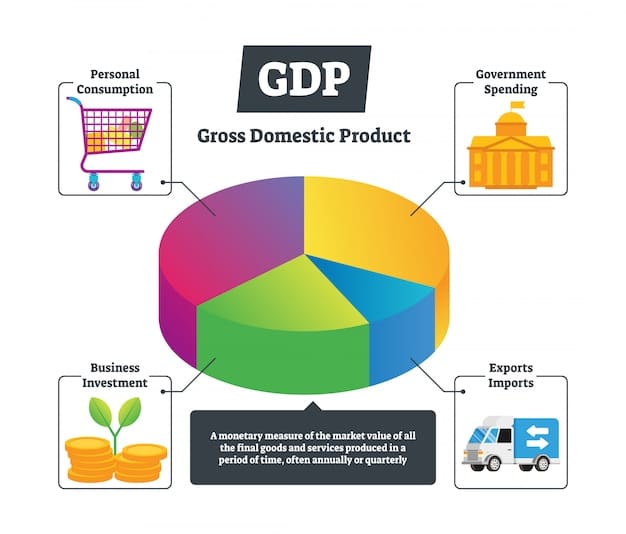Small Businesses: Fueling Innovation and Job Growth in the US Economy

Small businesses are vital to the U.S. economy because they drive innovation, create jobs, and support local communities, contributing significantly to overall economic growth and stability.
The United States economy is a complex ecosystem, and at its heart are the millions of small businesses that drive much of its dynamism. Understanding the role of small businesses in driving economic innovation and job creation in the US is crucial for policymakers, entrepreneurs, and anyone interested in the nation’s economic health. This article explores how these businesses act as engines of growth, innovation, and employment.
The Economic Significance of Small Businesses
Small businesses play a pivotal role in the United States economy. They not only contribute to the nation’s GDP but also foster a competitive landscape and provide opportunities for entrepreneurship.
Contribution to GDP and Economic Output
Small businesses are significant contributors to the U.S. Gross Domestic Product (GDP). Their collective economic output is substantial, making them key players in the national economy.
These businesses often operate with efficiency and agility, quickly adapting to market changes and contributing to overall economic stability. They are also more likely to reinvest profits locally, which further stimulates economic activity within their communities.

Job Creation and Employment
One of the most significant contributions of small businesses is in the area of job creation. They are a major source of new employment opportunities in the US.
Unlike large corporations, small businesses often hire at a faster rate and are more willing to take on employees with diverse backgrounds and skill sets. This inclusive hiring practice contributes to a more equitable and robust job market.
- Provide the majority of new jobs.
- Offer employment opportunities in underserved communities.
- Foster a culture of innovation and entrepreneurship.
In summary, small businesses are crucial drivers of the United States economy, contributing significantly to GDP and job creation. Their adaptability and community focus make them essential for economic stability and growth.
Innovation Hubs: The Role of Small Businesses
Small businesses are not just economic drivers; they are also centers of innovation. Their size and flexibility allow them to develop new products, services, and business models.
Driving Technological Advancements
Small businesses often lead the way in adopting and developing new technologies. They are quick to experiment with innovative solutions to improve efficiency and customer experience.
This technological agility allows them to compete with larger corporations and disrupt traditional industries. They frequently create niche markets and cater to specialized customer needs that larger companies may overlook.
Fostering Creativity and New Ideas
The entrepreneurial environment of small businesses fosters a culture of creativity and innovation. Employees are often encouraged to think outside the box and contribute new ideas.
This collaborative atmosphere can lead to groundbreaking innovations and the development of unique business models. Small businesses are often more open to taking risks, which can result in significant rewards.

- Encourage experimentation and risk-taking.
- Provide a platform for new ideas and concepts.
- Adapt quickly to changing market conditions.
In conclusion, small businesses are vital innovation hubs, driving technological advancements and fostering creativity. Their agility and entrepreneurial spirit make them essential for economic progress.
Supporting Communities: The Local Impact
Small businesses are deeply rooted in their local communities. They provide essential services, support local initiatives, and contribute to the social fabric of their neighborhoods.
Strengthening Local Economies
Small businesses play a crucial role in strengthening local economies. By generating revenue and providing employment, they contribute to the overall economic health of their communities.
They also tend to source products and services locally, creating a ripple effect that benefits other businesses in the area. This local focus helps to build a more resilient and self-sufficient community.
Contributing to Social and Cultural Vibrancy
Beyond their economic contributions, small businesses add to the social and cultural vibrancy of their communities. They sponsor local events, support community organizations, and create unique gathering places.
These activities foster a sense of community and pride, making neighborhoods more attractive places to live and work. Small businesses often reflect the unique character and identity of their local areas.
Small businesses are not just economic entities; they are vital community pillars. They strengthen local economies and contribute to the social and cultural vibrancy of their neighborhoods.
Challenges Faced by Small Businesses
Despite their importance, small businesses face numerous challenges, including access to capital, regulatory burdens, and increasing competition.
Access to Capital and Funding
One of the most significant challenges for small businesses is access to capital and funding. They often struggle to secure loans and investments needed to start or expand their operations.
Traditional lending institutions may be hesitant to lend to small businesses due to perceived risks. This can limit their ability to innovate, grow, and create jobs. Alternative funding sources, such as crowdfunding and angel investors, are becoming increasingly important.
Regulatory Burdens and Compliance
Small businesses often find it difficult to navigate the complex web of regulations and compliance requirements. These burdens can be particularly challenging for startups and businesses with limited resources.
Compliance costs can be significant, diverting resources away from core business activities. Streamlining regulations and providing support for compliance can help small businesses thrive.
- Difficulty securing loans and investments.
- High costs associated with compliance.
- Limited resources for navigating complex regulations.
In summary, access to capital and regulatory burdens are major challenges for small businesses. Addressing these issues is essential for fostering a supportive environment for entrepreneurship and growth.
Government Support and Policies
Government policies and support programs play a vital role in helping small businesses overcome challenges and thrive. These initiatives can range from tax incentives to access to training and resources.
Tax Incentives and Financial Assistance
Tax incentives and financial assistance programs can provide crucial support for small businesses. These initiatives can help reduce the financial burden and encourage investment and growth.
Governments can offer tax credits for hiring new employees, investing in technology, or expanding operations. Financial assistance programs, such as grants and low-interest loans, can provide much-needed capital for small businesses.
Training and Resources
Access to training and resources is essential for helping small businesses succeed. These programs can provide entrepreneurs with the skills and knowledge they need to manage their businesses effectively.
Government-sponsored training programs can cover a wide range of topics, from financial management to marketing and sales. Resource centers and mentorship programs can provide ongoing support and guidance for small business owners.
Supportive government policies are vital for fostering a thriving small business sector. Tax incentives and access to training and resources can help small businesses overcome challenges and drive economic growth.
The Future of Small Businesses in the US Economy
The future of small businesses in the US economy looks promising, with opportunities for growth and innovation. However, it is essential to address the challenges they face and provide ongoing support.
Embracing Digital Transformation
Digital transformation is essential for small businesses to remain competitive in the modern economy. Embracing new technologies can help them improve efficiency, reach new customers, and innovate.
Small businesses can leverage digital tools for marketing, sales, customer service, and operations. E-commerce platforms, social media, and data analytics can provide valuable insights and opportunities for growth.
Adapting to Changing Market Conditions
Small businesses must be adaptable and resilient to succeed in a rapidly changing market. This requires a willingness to innovate, experiment, and learn from failures.
Staying informed about market trends, customer preferences, and technological advancements is crucial. Small businesses that can quickly adapt to changing conditions will be well-positioned for long-term success.
- Adopting new technologies and digital tools.
- Staying informed about market trends.
- Building a resilient and adaptable business model.
In conclusion, the future of small businesses in the US economy depends on their ability to embrace digital transformation and adapt to changing market conditions. With ongoing support and a focus on innovation, small businesses will continue to drive economic growth and create jobs.
| Key Point | Brief Description |
|---|---|
| 🚀 Innovation Drivers | Small businesses are key sources of new ideas and technologies. |
| 💼 Job Creation | They provide numerous employment opportunities, boosting the economy. |
| 🏘️ Community Support | They strengthen local economies and contribute to community vibrancy. |
| 💰 Economic Growth | Significantly contribute to the US GDP through their operations. |
Frequently Asked Questions (FAQ)
▼
Small businesses are crucial because they drive innovation, create jobs, and support local communities, contributing significantly to economic growth and stability.
▼
Small businesses are major sources of new employment opportunities, often hiring at a faster rate than larger corporations and providing jobs in underserved communities.
▼
Small businesses often face challenges such as limited access to capital, regulatory burdens, and increasing competition, which can hinder their growth and development.
▼
Government support includes tax incentives, financial assistance programs like grants and low-interest loans, and training and resources to help small businesses manage effectively.
▼
Small businesses can adapt by embracing digital transformation, staying informed about market trends, and building a resilient and adaptable business model that allows for quick responses to change.
Conclusion
In conclusion, small businesses are the backbone of the US economy, driving innovation, creating jobs, and supporting local communities. Despite the challenges they face, their importance cannot be overstated, and ongoing support is essential for their continued success and contribution to economic growth.






